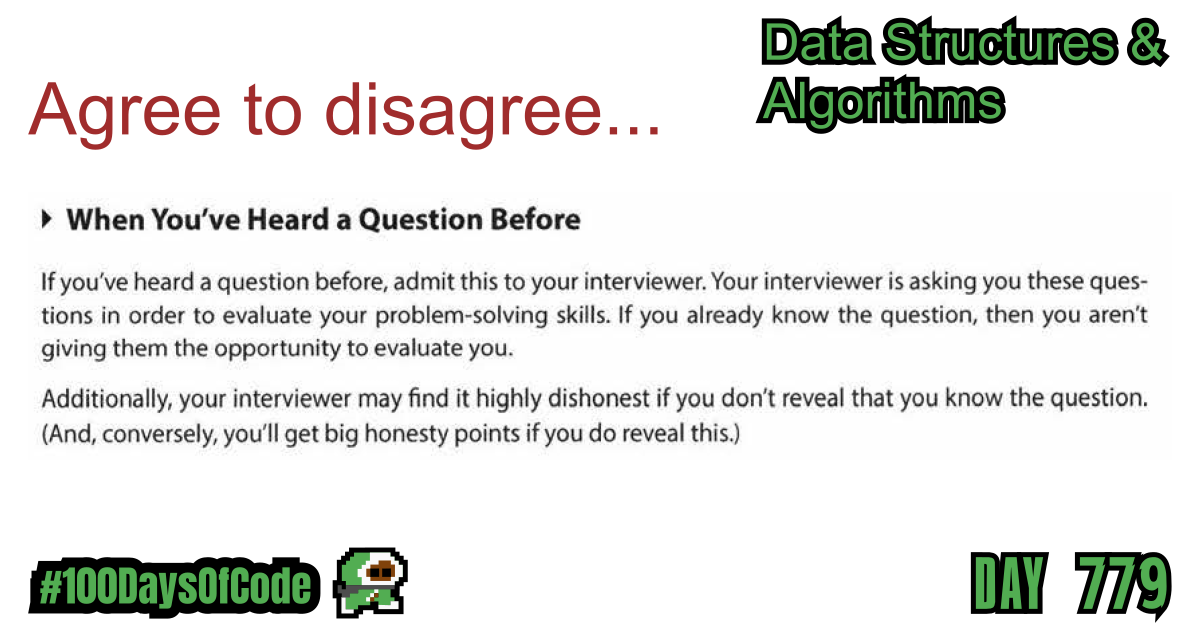I once again, split my time between two study tracks today. I finished reading through the “Technical Questions” section of the book, “Cracking the Coding Interview” (CTCI) by Gayle Laakmann McDowell. The other half of my time was used to read some of the material for the Node.js section of the “Full Stack JavaScript” development course from The Odin Project. The progress was steady today.
The final portions I read through in the “Technical Questions” section of the CTCI book were a bit controversial for me. They mentioned how an interviewee should conduct themselves during a technical interview and I had some concerns. My biggest concern was regarding the point on rejecting familiar questions in preference of unfamiliar ones. The author argues here that it is dishonest when an interviewee chooses not to disclose their level of comfort for the presented coding problem. For example, if the interviewee is very comfortable with the type of problem presented, the author argues that they should inform the interviewer so that they can be presented with a different problem that they are not familiar with. The author further argues that this is an integrity issue and interviewees should look to be challenged in technical interviews. Here is the problem though.
Technical interviews are already challenging by nature. It is unnatural to code in an environment where your performance is being critically judged in a timed event with an unknown question derived from a huge material pool. That in and of itself is very challenging for most interviewees. To now inform the interviewees that they should deny all questions that are similar to what they have practiced with prior is asking them to shoot themselves in the foot. A technical situation is already abnormal and not representative of what daily work as a developer looks or feels like. Therefore, it does not seem reasonable to advise interviewees to add further difficulty to the event. At least that is my opinion. Perhaps I lack the experience as an interviewer to see why they feel this way on the topic.
For my backend studies I read the CORS section from The Odin Project. I am still a bit unfamiliar with how this security feature is implemented but I am hoping that the more I read, the more I will come to understand.
TLDR;
Okay, so here are the highlights of what I did:
- Data Structures and Algorithms (DSA) -> Continued reading through the book “Cracking the Coding Interview” by Gayle Laakmann McDowell again. Finished reading the technical interview section. I had some opinions on this one lol.
- Backend -> Continued going through the material on API development with
Node.jsfrom The Odin Project’s backend development course. Read through the section on CORS.
Goal For Round 8 of the #100DaysofCode Challenge
This is my eighth round of the “#100daysofcode” challenge. I will be continuing my work from round five, six, and seven into round eight. I was working through the book “Cracking the Coding Interview” by Gayle Laakmann McDowell. My goal was to become more familiar with algorithms and data structures. This goal was derived from my goal to better understand operating systems and key programs that I use in the terminal regularly e.g. Git. This goal was in turn derived from my desire to better understand the fundamental tools used for coding outside of popular GUIs. This in turn was derived from my desire to be a better back-end developer.
I am currently putting a pause on the algorithm work to build some backend/full stack projects. I primarily want to improve my skills with the back-end from an implementation perspective. I have improved tremendously in terminal and CLI skills but I lost focus due to how abstract the algorithm concepts got. I wanted to work on things that were more tangible until I can get to a position where I could directly benefit from improving my algorithm skills and theoretical knowledge. So that’s the focus right now. Build my backend skills and prove my full stack capabilities by building some dope projects.
Again, I still have no idea if my path is correct but I am walking down this road anyways. Worst case scenario I learn a whole bunch of stuff that will help me out on my own personal projects. Best case scenario I actually become one of those unicorn developers that go on to start a billion dollar company… You never know LOL.
